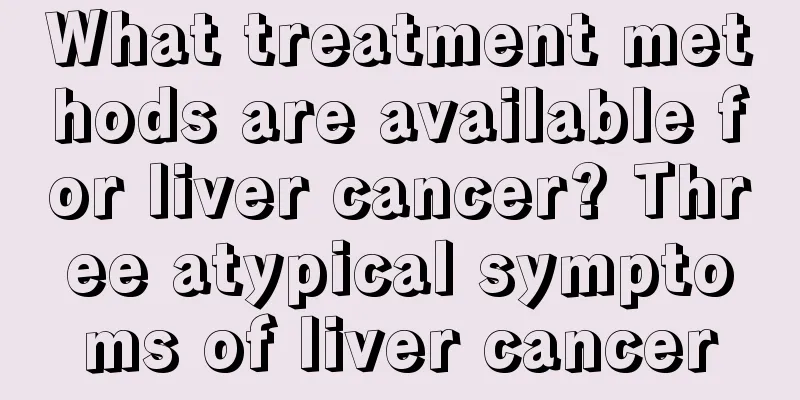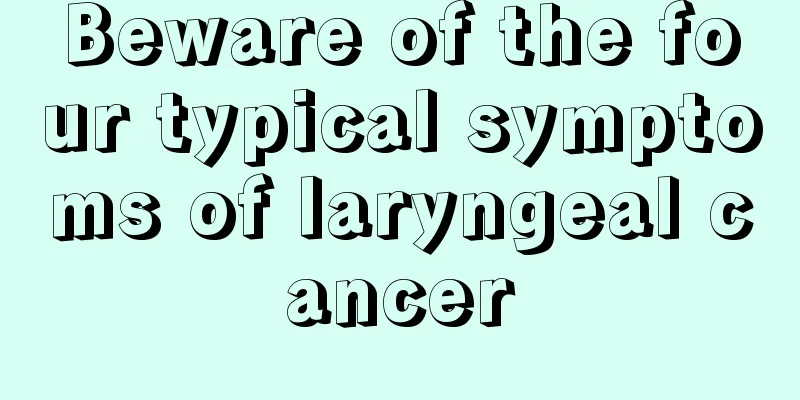What treatment methods are available for liver cancer? Three atypical symptoms of liver cancer

|
Primary liver cancer is one of the most common malignant tumors in my country. According to statistics from the Ministry of Health, about 130,000 people die from liver cancer each year in my country, accounting for 40% of the total number of liver cancer deaths worldwide. Symptoms of liver cancer, such as pain in the liver area, jaundice, diarrhea, etc., are well known to everyone, but do you know that there are some atypical symptoms of liver cancer? If you really have liver cancer, what treatment options are available to patients? The following will introduce to you. Atypical symptoms of liver cancer 1. Hypoglycemia The liver itself has a strong compensatory ability. Only when the area of liver damage exceeds 70%-80% will obvious hypoglycemia occur, manifested as symptoms such as dizziness, fatigue, and sweating. 2. Polycythemia Patients with long-term cirrhosis or chronic liver disease who have increased red blood cells without other reasons may be an early sign of liver cancer and should be taken seriously. This is because when liver cancer cells divide, they produce a lot of erythropoietin, which leads to excessive red blood cell production. However, while liver cancer patients have increased red blood cells, their white blood cells, platelets, and lymphocytes do not increase. Therefore, the more red blood cells there are, the more vigorously the liver cancer cells divide. Clinical manifestations include flushed face and sanguineous appearance. 3. Hyperlipidemia Patients with cirrhosis and chronic hepatitis who have ruled out high-fat diets, heavy drinking, lack of exercise, and certain endocrine diseases but still have hyperlipidemia are also considered a sign of liver cancer. Clinically, it manifests as symptoms and signs of hyperlipidemia, such as obesity and atherosclerosis. Five treatments for liver cancer 1. Surgical treatment (1) General condition of the patient: ① The patient is in good general condition, with no serious damage to heart, lung and kidney functions, and is estimated to be able to tolerate surgery; ② The liver function is well compensated, or only slightly damaged, and is classified as Grade 1 according to the liver function classification; or is Grade 2, and after short-term liver protection treatment, the liver function recovers to Grade 1; ③ There is no extensive extrahepatic metastatic tumor. (2) Radical resection can be performed in the following cases: ① Single micro or small liver cancer; ② Single large or giant liver cancer growing outside the liver, with a relatively smooth surface, relatively clear surrounding boundaries, and less than 1/3 of the liver tissue destroyed by the tumor; ③ Multiple tumors, with less than 3 tumor nodules, and confined to one lobe or segment of the liver. II. Ultrasound or CT-guided percutaneous tumor puncture pain relief treatment Under the guidance of B-ultrasound or CT, percutaneous puncture of the tumor, radiofrequency, microwave, cryotherapy or injection of anhydrous alcohol, and local physical therapy such as in vitro high-frequency focused ultrasound. These methods are suitable for patients with small tumors that cannot or are not suitable for surgical resection, especially those with early tumor recurrence after liver resection. Its advantages are: definite efficacy, safety and simplicity, and few side effects. Some patients can achieve good treatment results. 3. Chemotherapy In principle, systemic chemotherapy is not performed. Depending on the specific situation of the patient, selective regional chemotherapy can be used, such as perfusion through the hepatic artery, portal vein or liver isolation, which may improve the efficacy and reduce the toxic side effects of chemotherapy, and is expected to improve the efficacy. What is valuable is that selective regional chemotherapy after surgery does have an effect on preventing recurrence, which has been confirmed by many parties. 4. Radiation therapy Radiotherapy is a comprehensive treatment mainly for patients with good general condition, good liver function, no cirrhosis, no jaundice, ascites, no hypersplenism and esophageal varices, relatively localized tumors, no distant metastasis, and who are not suitable for surgical resection or have recurrence after surgery. 5. Biological treatment Biological treatment is mainly immunotherapy. It has been widely confirmed that liver cancer patients have low immune function, which also suggests the possibility of immunotherapy and biological treatment. Although biological treatment has shown good prospects, there are still many difficulties and problems. Sometimes, although a variety of biological response modifiers are used and several immune indicators are expected to return to normal, cancer cells cannot be completely eliminated or even the development of tumors cannot be stopped. |
>>: What are the symptoms of lung cancer? These four common symptoms of lung cancer are diagnosed
Recommend
Can prostate cancer be transmitted through blood?
The early symptoms of prostate cancer are not ver...
Are there any side effects of nose surgery? How to prevent them?
Female friends often choose to have plastic surge...
Attention! Why does liver cancer favor middle-aged men?
In recent years, liver cancer has become a major ...
Things to note after artificial insemination
With the improvement of medical standards, many t...
Can leek and ginger juice enhance sexual function and stop diarrhea?
Chives and ginger are very common ingredients in ...
Can you still eat kelp if it's moldy?
Due to its popularity, kelp can now be found ever...
Is soaking deer penis in wine effective in treating impotence?
The problem of impotence makes many men suffer, a...
Why does masturbating too much lead to kidney deficiency
Many young male friends, because they are in adol...
What is the difference between Yin Yoga and Flow Yoga?
In real life, yoga is very familiar to many peopl...
How to treat recurrent shingles?
Shingles is caused by a viral infection. Generall...
It turns out that bacterial food poisoning has so many symptoms
Bacterial food poisoning is a form of food poison...
How is prostate cancer caused
How is prostate cancer caused? Prostate cancer ma...
What are the postures and times that are most conducive to pregnancy?
There are some couples in life who are always fac...
Which hospital is the best for laryngeal cancer
Which hospital is the best for laryngeal cancer? ...
What can I use instead of eyebrow pencil
Sometimes, if your eyebrow pencil breaks accident...









